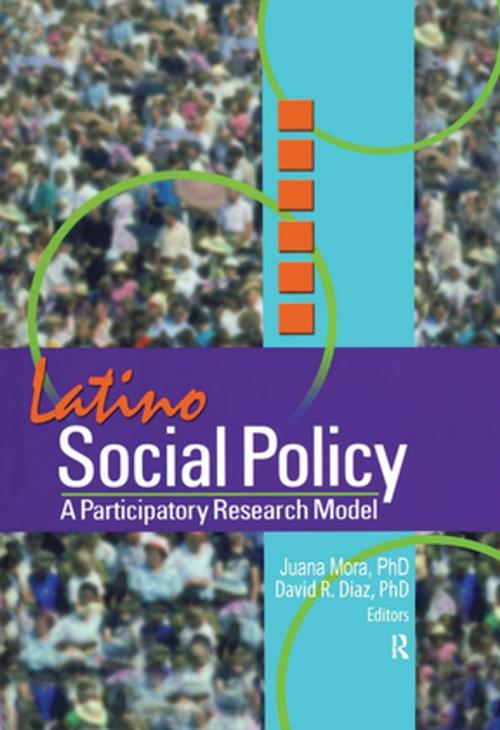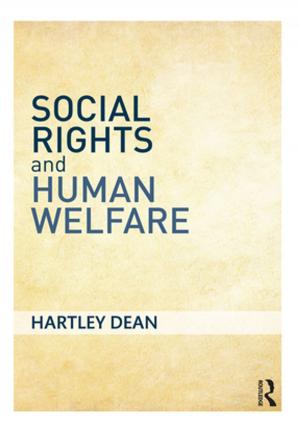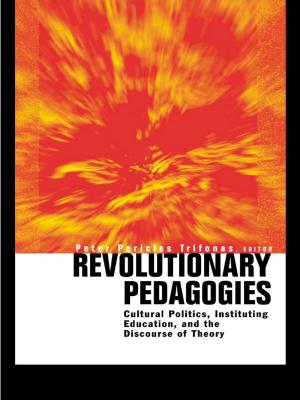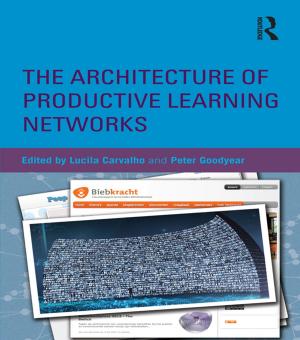Latino Social Policy
A Participatory Research Model
Nonfiction, Social & Cultural Studies, Social Science, Social Work, Cultural Studies, Ethnic Studies, Sociology| Author: | Juana Mora, David Diaz | ISBN: | 9781317719052 |
| Publisher: | Taylor and Francis | Publication: | December 22, 2015 |
| Imprint: | Routledge | Language: | English |
| Author: | Juana Mora, David Diaz |
| ISBN: | 9781317719052 |
| Publisher: | Taylor and Francis |
| Publication: | December 22, 2015 |
| Imprint: | Routledge |
| Language: | English |
Examine alternative strategies to resolving important Latino social issues!
Latino Social Policy: A Participatory Research Model examines the failure of traditional research methods to address major social needs in Latino communities, promoting instead a participatory/action approach to research that is socially-and scientifically-meaningful. Experts from a variety of disciplines focus on nontraditional strategies that engage community residents in community-research projects, shortening the distance between the researcher and the subject. This unique book recounts lessons learned on conducting Participatory Action Research (PAR) in Latino communities using techniques based on anthropology, education, community health and evaluation, and urban planning.
Latino Social Policy: A Participatory Research Model addresses non-traditional methods of reducing the tension between the reality of interaction with the subject community and the academic training structures used by researchers. The book promotes a new vision and practice of research design in which the subject is central to the process, advocating a participatory approach to produce qualitatively different research based on community identified problems and needs. Contributors examine the value of integrating local knowledge, language, and culture into the methodological design, the ethics of conducting research in Latino communities, and the internal conflicts Chicana/o researchers face within their profession and in the field.
Topics addressed in Latino Social Policy: A Participatory Research Model include:
- community health and Central Americans in Los Angeles
- ethnography and substance abuse among transnational Mexican farmworkers
- identity and field research in Mexico
- the Latino Coalition for a New Los Angeles (LCNLA)
- researcher/community partnerships
- and much more!
Latino Social Policy: A Participatory Research Model includes case studies, ethnographies, and vignettes that illustrate participatory approaches and outcomes in Latino research. The book is equally valuable as a textbook for academics and students working in the social sciences, public policy, and urban planning, and as a professional guide for community leaders and organizations interested in developing research partnerships.
Examine alternative strategies to resolving important Latino social issues!
Latino Social Policy: A Participatory Research Model examines the failure of traditional research methods to address major social needs in Latino communities, promoting instead a participatory/action approach to research that is socially-and scientifically-meaningful. Experts from a variety of disciplines focus on nontraditional strategies that engage community residents in community-research projects, shortening the distance between the researcher and the subject. This unique book recounts lessons learned on conducting Participatory Action Research (PAR) in Latino communities using techniques based on anthropology, education, community health and evaluation, and urban planning.
Latino Social Policy: A Participatory Research Model addresses non-traditional methods of reducing the tension between the reality of interaction with the subject community and the academic training structures used by researchers. The book promotes a new vision and practice of research design in which the subject is central to the process, advocating a participatory approach to produce qualitatively different research based on community identified problems and needs. Contributors examine the value of integrating local knowledge, language, and culture into the methodological design, the ethics of conducting research in Latino communities, and the internal conflicts Chicana/o researchers face within their profession and in the field.
Topics addressed in Latino Social Policy: A Participatory Research Model include:
- community health and Central Americans in Los Angeles
- ethnography and substance abuse among transnational Mexican farmworkers
- identity and field research in Mexico
- the Latino Coalition for a New Los Angeles (LCNLA)
- researcher/community partnerships
- and much more!
Latino Social Policy: A Participatory Research Model includes case studies, ethnographies, and vignettes that illustrate participatory approaches and outcomes in Latino research. The book is equally valuable as a textbook for academics and students working in the social sciences, public policy, and urban planning, and as a professional guide for community leaders and organizations interested in developing research partnerships.















